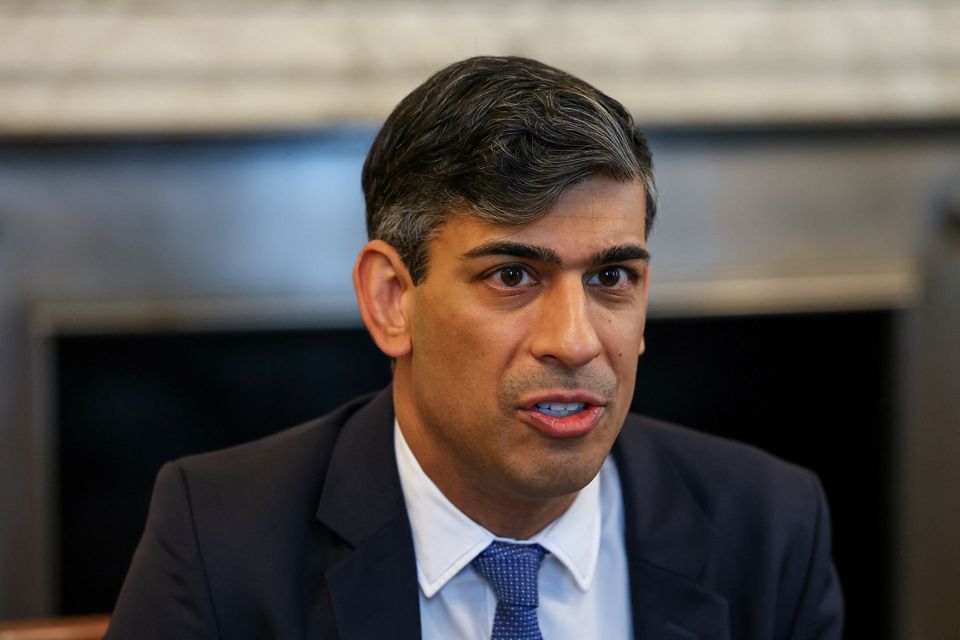Letters: Could a united Ireland be the obvious solution to migration row with UK?
British prime minister Rishi Sunak. Photo: PA
I am writing to express my deep concern regarding the recent comments made by British prime minister Rishi Sunak regarding the effectiveness of the Rwanda project and its implications for migration to the Republic.
Mr Sunak’s assertion that the influx of migrants to Ireland is proof of the effectiveness of his threats of deportation is not just insensitive, it is fundamentally flawed and flies in the face of decent neighbourliness.
While it is undeniable that a fair and robust immigration system is necessary, it is equally crucial to acknowledge the contributions migrants make to our society. Migrants play a vital role in shaping our communities and enriching our nation.
Tensions surrounding immigration are exacerbated by underlying issues such as housing shortages, infrastructure deficiencies and lack of investment resulting from government policies over the years. These issues need to be addressed comprehensively to create a more inclusive and equitable society.
Further, the suggestion of sending or encouraging illegal migrants from Britain to the north of Ireland, where they could potentially cross the Border unchecked, is deeply concerning. Immediate measures, such as implementing checks at Northern Ireland’s airports, are necessary. Additionally, discussions about strengthening national borders must consider the possibility of reunifying Ireland, which could provide a more sustainable solution.
Mr Sunak’s comments serve only to highlight the urgency of these conversations. While there may be financial implications associated with reunification, it is becoming increasingly apparent that we cannot afford to ignore the issue. Reunification mighty ultimately be the most viable path forward.
It is imperative that we approach these complex issues with empathy, compassion and a commitment to human rights.
Killian Brennan, Malahide Road, Dublin 17
Hate-speech legislation is just the secular equivalent of our old blasphemy laws
One had hoped that after the shot across the bows delivered by the people in the recent referendums, the establishment might think twice about forcing more of its woke agenda down our throats.
However, it appears the Government is pushing ahead with so-called hate-speech laws. Perhaps because it doesn’t have to get the public’s approval via a referendum, it is hoping to sneak it through by default
Hate-speech laws are essentially the secular equivalent of the old blasphemy laws, with the exception that the “liberal” enforcers of the former are considerably more intolerant and unforgiving than their religious equivalents. Secularists do not do confession or absolution.
As the very wise social commentator GK Chesterton once observed: “If men will not be governed by the 10 commandments, they shall be governed by the 10,000 commandments.”
So, expect more and more ludicrous cases before our courts, which will have the unenviable task of arbitrating on this nonsense. Essentially, a crank’s charter.
Eric Conway, Navan, Co Meath
Maybe we should all fret if reasonable behaviour is coming under threat
Bernie Linnane maintains there is no need to fear the proposed hate- speech law that is passing through Leinster House (‘No need to fret over hate-speech laws, Scotland proves they work just fine’, Letters, April 30).
Citing the brouhaha surrounding JK Rowling’s “testing” of the law there, Ms Linnane says: “No one’s right to be boorish, ill-mannered, gratuitously offensive or insulting was denied.” Quite.
But perhaps the Scots were erring on the side of caution, fearing a backlash.
In any event, since we in Ireland seem to tolerate such behaviour as mentioned above, it may be reasonable argument, reasoned response and rational behaviour that suffers under such a law.
Perhaps there is a need for your columnists, your contributors and, dare I say, your letter page correspondents to fret after all. Time will tell.
Peter Declan O’Halloran, Belturbet, Co Cavan
Overstating Ireland’s contribution to climate change causes anxiety
Martina Devlin makes the oft-stated but ill-informed claim that Ireland is a significant contributor to climate change with its high agriculture and greenhouse gas emissions, and as a consequence our hands are far from clean as drivers of migration (‘Ireland has an unpaid debt to migrants who are hit hardest by climate change’, Irish Independent, April 26).
She states that by failing to respond fast enough to climate shock we are responsible for altered weather patterns, causing droughts, flooding, hurricanes and wildfires, laying waste to crops and destroying livestock, thus hindering people’s attempts to earn a living.
To put Ireland’s contribution to climate change in context, however, requires a little knowledge of our history and, more importantly, the scientific facts.
Ireland missed out on the industrial revolution thanks to British malign policies over the centuries, which meant that, unlike the major polluters, we have little or no historical footprint in terms of global warming.
After independence, we were gifted a basket-case economy that lasted well up to the 1990s when our economy and population began to grow. One of the benefits is that many of our industries today are relatively clean and environmentally responsible.
In terms of scientific data, the UN Framework Convention on Climate Change (UNFCCC), the foremost authority on climate matters, and the Environmental Protection Authority (EPA) state that Ireland’s contribution to global warming is a minuscule 0.11pc of the global total.
Ms Devlin refers to Ireland’s high agriculture emissions as contributors, again without specifying the quantities.
Agricultural emissions are about 35pc of Ireland’s overall emissions, which equates to a mere 0.0366pc of global emissions.
Perusal of the world map shows that Ireland’s land area is about 0.0566pc of the global territorial mass, a mere speck in the ocean, unlike the vast land masses of the big polluters such as the EU, US, China, Russia, India, Brazil and Australia, among others.
Ireland has a moral obligation to help those countries in most need, mainly through our heroic NGOs working in the most deprived and dangerous regions of the world.
Ireland also contributes through aid and other contributions as part of the EU, but rhetoric conflating our responsibility with the G7 and G20 countries causes undue anxiety.
John Leahy, Wilton Road, Cork
Join the Irish Independent WhatsApp channel
Stay up to date with all the latest news















